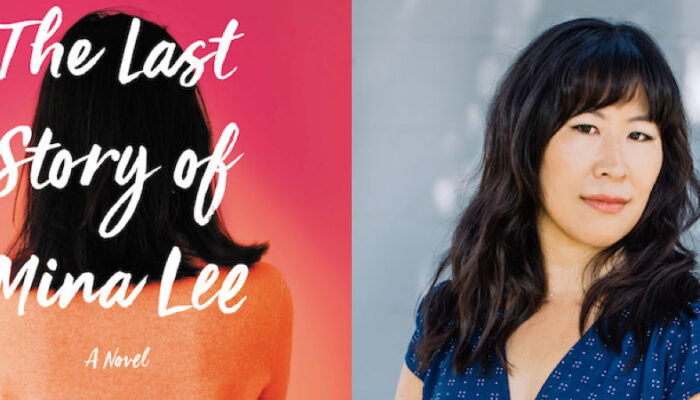Mike Fu takes us to Los Angeles, the Bay Area, and Shanghai in his meditation on an ex-lover.
Desiderata
O, this maudlin mess! Twenty years old and nowhere to go. You feel ancient and aware, leavened by the surrounding pleasures of the California summer. Yet there is also a nagging sense of stasis. The sunshine without season, the beauty of every street in your homestead, the implacable routine of work and play and work and play: it’s enough to drive you mad. Then one day there is a cathartic downpour. It’s sprinkling when you go to get lunch. Later, as you’re driving home, the rain starts coming down in earnest. The sky is blanketed in heavy gray; a rainbow sprouts over distant rooftops in Koreatown. Colors blend together on your windshield, fat drops pelt your windows. You are a silent prisoner in your vehicle, amazed at the abandon with which Los Angeles releases herself. On the stereo David Bowie cries, Oh no, love, you’re not alone! Edging forward carefully in traffic, you let out an incredulous laugh. You have waited months for rain, waited months for nature to reinvigorate and force a change in you, to endow you with agency and passion, to shake up this season of cigarettes and helplessness, and allow you to confront—
Him. How you long for him. You meet him during your first week back home, after half a year’s heartache in France. Why, he’s materialized on your doorstep. A cosmic dial clicks into place. You are with mutual friends that first night, and you regard him with curious detachment, observing the delicate play of sincerity and guardedness on his face. He asks you about Paris, a bloom of excitement trembling in his voice. You are hesitant, at first, but then you begin to put words to it all, the spring rain and lonely walks home on the Boulevard Beaumarchais, the vomiting in strange bathrooms—
You fall quickly into companionship. You while away the summer at his apartment, tending to plants, getting high, baking banana bread. Sometimes your friends drop by to guzzle forties and play music. Other nights it’s just the two of you, and he cooks ahi tuna steak with rosemary. You drop cucumber slices into the water pitcher he keeps in the fridge. You listen to Roberta Flack on vinyl while smashing roaches in the kitchen. The whole apartment is cramped and stuffy. He compensates for poor natural light with kitschy lamps picked up from flea markets. Years later, you think back and realize that the apartment was probably haunted. Horrible noises emerge from his speakers late at night. Sometimes the CD player turns itself on and the ominous strains of L’Arlesienne tremor into the shadowy space. He receives phone calls from an unknown number on a regular basis. When he picks up, there is just the sound of some low churning, never a voice. The long hallways of the building are almost always empty, still and lifeless as a pool of black rainwater. Sometimes the elevators go haywire, traveling up and down that cold dark shaft between basement and penthouse over and over and over. One night the doors open of their own volition as the two of you approach from tens of feet away in the quiet marble lobby. You look at each other and shriek. We’re taking the stairs, he says, and you run up all seven flights and down those dim corridors and into the safety of his apartment at last and laugh and laugh breathlessly—
He’s anxious all the time. His eyes tremble even when shut. You talk about childhood at three in the morning while a black and white Godard movie flickers in the background. The two of you are drinking coffee. He sips his and sighs. Do you want to have a cigarette? he asks. He pronounces this word so beautifully, with casual emphasis on the last syllable. A cigarette: so delicate, trifling. Of course you do. You sneak onto the rooftop and drink in the view, the summer night, the wash of milky moon overhead. The downtown skyline shimmers with maddening romance. You feel wild and desperate as the 1920s Hollywood starlets for whom this building was built. As you smoke, you imagine yourself a century ago in this desert frontier of a city and begin to twirl beneath the moonlight. He laughs his deep, rich singer’s laugh, holds his arms out and lopes and spins toward you—
Then you drive home. You curse yourself. A heaviness nests in the pit of your stomach. The closer you get to him, the more distant the possibility seems: that this could transform from the tender chrysalis of friendship into something else, some beautiful, indescribable thing. You want to cry out in anguish. Instead you keep silent, eyes fixed on the stretch of dark road ahead, deserted at this hour. You blame yourself for such narcissism, the desire to be desired and sought after, filling up someone’s thoughts as in a fever dream. At least that is the effect he has on you. Those honey-colored eyes, that playful insouciance giving way to warmth and, could it be, vulnerability; he makes you feel achingly full, bursting with life. But somehow you both linger at an impasse. You are afraid to consider what this might mean. After you get home, you startle yourself in the kitchen. Drinking a glass of water, you see the contours of a figure in black in your window. A small terror grips you and abates just as quickly. It is your reflection, no more.
Mid-summer, you, he, and a group of friends decide to go on a weekend camping trip. The lot of you are taking four cars, traveling from opposite ends of California to meet in Big Sur. No one thought ahead to reserve a campsite. You end up having to make contingency plans, driving down the Pacific Coast Highway with no cellphone reception. You settle on a stretch of sand called Morro Bay, an unobstructed beachfront by a sleepy residential community that swallows you up: all ten of you, your cases of beer, your bags of magic mushrooms, your sunscreen. You find one another there as if by miracle and celebrate, singing songs under the stars. Giddy and ravenous, you cook hot dogs and marshmallows over a fire. At one point, you hold hands with him and run across the beach to pee in the ocean together.
Don’t get carried away by the tide! he warns.
I won’t! you yell back.
You haven’t felt happier or more despondent your entire life.
You go to sleep exhausted.
You wake up in a cool gray morning of preternatural calm. Your friends are stumbling back into consciousness, one by one, shaking out the sand from their hair and their sleeping bags. Breakfast is champagne and strawberries. The clouds disperse before too long, allowing the hot summer sun to pierce the firmament and beat down your necks. You cast off your shirt. Shortly before noon, half of your group, including you and him, eat mushrooms. Someone else takes acid. The rest stay sober to watch over your belongings and your collective propriety.
Then you are making your way through a dry brush, all brambles and dill plants and tarantula holes. You are in the middle of this tiered landscape: vehicles whizzing on the road above you, one gigantic, luminous cloud rolling across the blue sky, and a whole other universe down on the beach. Where is he? The question looms, enormous and unwieldy and freighted with a significance you are unable to process. There are flashes of white light in your peripheral vision. You feel as though you might burst into tears if you stare at any one thing for too long.
You and two friends look at tide pools, tread gingerly on the hot sand as it shifts nefariously beneath your feet. Your heart lurches in confusion. Then you see him, sitting alone, watching the tide. Psilocybin coats your thoughts with a dizzyingly bright edge, like sunshine on morning frost. Shards of chaotic light dance upon the ocean. He sits there stoically, curls of hair falling over his ears. This image is so powerful you gulp. The stretch of iridescent sea, the sharp beauty of his classical features, the organic thrill of your dilated pupils chronicling this splendor—
The sun sets in ripe, clean colors, practically pulsating with vitality. By evening you are yourself again. You lay next to him in a sleeping bag and stare into his face beneath shimmering constellations and shooting stars. You realize that it may be best to leave this be. Let it be. Let it be a beautiful memory. You resolve to regain your emotional footing and accept the status quo. Besides, he is leaving town for a while, going off to Europe on a family vacation. It will do you some good, you tell yourself, to turn your attention elsewhere.
After the camping trip and the long drive back into the city, you feel morose. At a dead end. Deadened. You try to get your mind on other things. You drink endless coffee at your internship, think vaguely of graduating in a year and what will happen after that. Your parents ask how you feel being back in the States, what you think of your job prospects in the industry. They are nervous for more than one reason. A year later, they will fly across the Pacific to attend your graduation and make you miserable for a week. Your mother, in the throes of menopause, will demand tearfully why you’ve never had a girlfriend. Before you even have a chance to fumble for an answer, she will exhort you to live a normal life and remember your responsibility to the family. Your father will look upon you with the same disappointment he’s harbored your entire life. He will voice his regret for not having pushed you to become an engineer or some other respectable character. You will slam hotel doors and take to the streets in anger—
But this has not yet come to pass. You are still blithely ensconced in this beautiful and wretched summer. Time stands still in Silver Lake until you’re awoken by that torrential rain. It’s Friday the thirteenth. You meet friends for dumplings and fried rice that night. The storm continues to unleash its fury on the corrugated metal rooftop of this shanty of a diner. Several buckets placed in one corner catch leaking water. You’re forced to speak loudly to one another over the din, giggling at the absurdity of rain — rain! — in the city of angels. It’s a different kind of darkness out there tonight, charged with electric potential, made thick and palpable by the storm. You sense that a change is imminent. This time with friends is also a chance to stave off any thoughts of him and his mixed signals.
He confides in you about so much: growing up closeted in Texas, explosive family dramas, ambivalence over choosing a major, making a career in the city. He trusts your opinion, wants your approval and validation, is eager and generous with his admiration for you and your closest friends. He is quick to contempt when it comes to other things, coldly derisive. You are unnerved by this other aspect of him. He seems haunted by some kind of darkness. Unpredictable, maybe even cruel. But then he smiles and speaks to you with genuine affection. He is nineteen and perfect for you, as far as you’re concerned. You are twenty, and so alone. You can’t stomach the idea of him with anyone else. You want him all to yourself. Or not at all. The latter seems more and more realistic. Forget him. Let this rain cleanse your memory of him.
That night you go to a few house parties around campus. You wander from room to room, feeling crushed and squeezed by the nonsensical babble that surrounds you. You wind down the evening in the company of a huge, docile brown-eyed dog at the home of an acquaintance, where a few friends gather, taking uninspired bong rips and eating almonds. Forget him, you think, eyes drooping. Forget him. You fall asleep on the futon.
You do well enough. Day by day you extricate yourself from anguish, ready to move on with your life and find other romantic prospects. Enough time wasted. No point in letting this paralyze you further. Then one day he calls you out of the blue and says he’s coming back to LA later in the week, and are you free? When you hang up, you’re floating on air. You fantasize about living in Paris with him and making passionate love every day. Oh, how you wish you weren’t prey to such fanciful emotions all the time. A few days later, you’re the first person he sees after returning from Italy. He drives straight to your apartment from the airport and gives you a long and warm hug when you open the door. You’re a sight for sore eyes, he says. The two of you sit on your squeaky bed and smoke pot, catching up. You gather the vacation was a bit of a disaster. Family squabbles and fundamental misunderstandings. He describes a moment while getting a haircut from an old Venetian man, looking into the mirror and not recognizing his reflection. It was so weird, he says. I didn’t know who I was. You shiver at this, for some reason. Do you know now? you ask. He smirks, blows smoke into the air. Of course, he says. I’m with you. Eventually he excuses himself to go home and unpack. It’s getting late, he says, yawning. You didn’t even get a chance to offer him tea.
* * *
It will take months, but it will happen. That fall, you will weave in and out of each other’s narratives, diluting your anxieties with bottom shelf liquor, medical marijuana, batches of psychedelic mushrooms and sniffs of cocaine. At one point you will be sprawled together in a house that your friends cohabit, peeling back the green leaves on a plastic flower, pressing its synthetic petals to your face, when you look over and see him wearing your glove on one hand—
The two of you will fall asleep on his couch on New Year’s Eve, his arm awkwardly cradling you at an angle while your heart thuds and a muffled cacophony rises from his speakers again but all you hear in your head is Elvis crooning, Love me tender, love me—
You will visit the newly reopened observatory in Griffith Park with him for the first time. You’d always regarded it from afar, this building perched on the hills, ethereal and displaced in its bone-white solemnity like a Mediterranean vision. But now you are here, at last. The moment feels portentous. You smoke cigarettes with him and gaze out at the gaudy smothered pink of sky crashing down on the streets below. Eventually you go inside the observatory where the planetarium show is about to start. In the darkness, your instinct is to reach for his hand, even though you know this would breach some undefined boundary between you. What is it about him, you sigh inwardly, looking upwards at the twinkling constellations projected in the dome.
After the show, you will descend into the park proper to find a secluded perch. You open a bottle of champagne and drink together. You have just found out that you are a finalist for a grant that may or may not send you across the ocean again in less than a year’s time. In between swigs of brut, it dawns on you that you have not eaten a thing all day. You will return to his apartment, out of habit, where he will cook another sumptuous meal of roasted lamb with garlic. Much later, in the quiet of his bedroom, you will make love for the first time. You will continue this way for a week, each night finding your way into each other’s embrace. February is a calm, cool month, prone to breezy days and nocturnal rain. You rarely return to your own apartment anymore. You stay with him every day. You eat slices of banana bread with honey in the morning. You curl up together in bed after a few glasses of wine or beer at night.
Your physical passion and sexual appetites seem to be of epic proportions. You will write about him in French in a notebook that once chronicled your loneliness. You try to take things as they come, to simply let it be. It is so hard to ascribe an emotion to this, now that you have penetrated into the realm of fantasy. You spend afternoons outdoors and watch fat clouds hovering above buildings while the sun traces its daily arc into slumber.
It will all happen so quickly.
You will finish school, live together, eke out an existence. You will not get that grant after all, quashing the delicious and masochistic reveries of Paris again. You feel untethered, floating steadily into a great chasm. He is no longer the beautiful specter you sought after. He vexes you with his piles of dishes and his flightiness and indifference. You will remember a time when he was, to you, rapturous as he was unattainable, encased in glass like an exquisite gem. Now you begin to see another side to him that inspires something close to revulsion.
You will break up with him in November. Why is this happening to me, he will cry, his lower lip quivering uncontrollably. You hate him for affirming exactly why with just those words, that unbelievable selfishness. You go to your friends’ potluck for Thanksgiving, returning alone to an empty studio apartment where you smoke a joint and put on Chungking Express. Unexpectedly, you dissolve into tears when Brigitte Lin and Takeshi Kaneshiro meet at a whiskey bar. The saxophone soundtrack makes you think only of his face and the time that you shared, the wonder and pain that he has made you feel. But it hurts so good to be alone, somehow.
Not for him. He becomes nearly unhinged in the weeks following. He shows up at your apartment unannounced and demands to be let in. Other times he meets you for coffee and ends up breaking down into sobs. He screams and pleads and tells you he wasn’t himself. You banish him in fits of uncharacteristic rage, cursing him, throwing things across the room. Get out of my fucking house, you hiss, shaking. How dare you.
Two months later, you will get back together. You are too weak to go it alone.
The next summer, you will move to New York. By then you both have agreed it will be best to part ways. Right before your cross-continental move you will go on one last journey together to the Far East. You both have agreed that the tension in your lives will not resolve easily nor in each other’s company. It is nice to forget or postpone these concerns, though, for a moment or a day, examining trinkets in front of Sensō-ji Temple or drinking beer on a river cruise with your Japanese lady friends from the Sorbonne.
When you arrive in Shanghai, your parents will treat him with surprising civility and awkward affection. Your teeth are so perfect, your mother will tell him, and your hair is so lovely. She declares him a Greek god. You walk with him around the Yu Gardens, Nanjing Road, the waterfront by the Bund where he buys bamboo figurines and the markets by the City God Temple where he buys even more frivolous wares.
You’re so nice to spend all day showing around this friend, your mother will say to you.
He has dinner with your family just once. Their politesse and willful ignorance are more stifling than the humidity outdoors. You drink wine and feel glum, confused again, prodding at plates of steamed fish and diced potatoes. He will thank your parents on the street with a sterile handshake. The evening blue descends rapidly in the neighborhoods of Xuhui, where an effluence of cars and motorcycles and buses and pedestrians glide past one another in a frenetic waltz. He will hug you good night and head towards the metro to go back to his hostel. And as you begin to move in the other direction, you won’t be able to keep yourself from looking back at that crosswalk, searching for him in the teeming crowd and shuddering when you can’t find any trace of—




